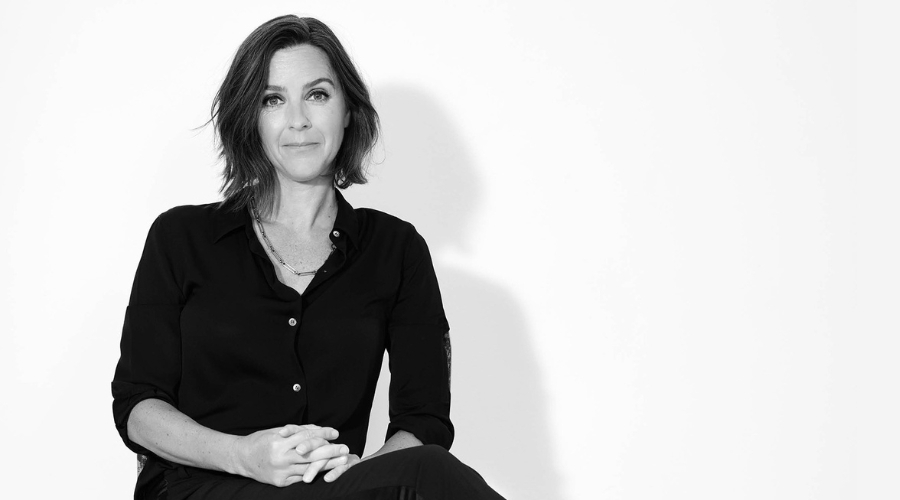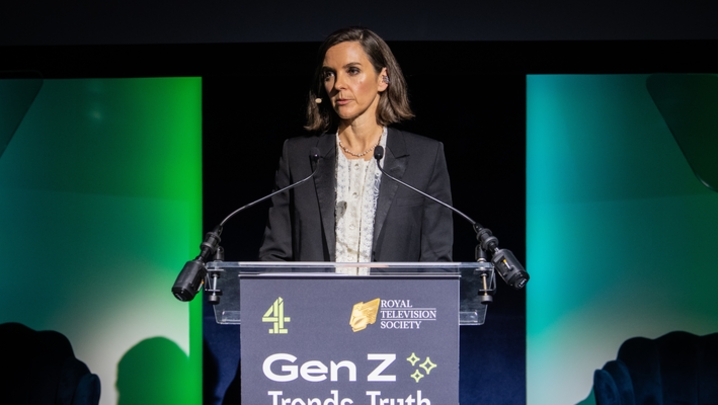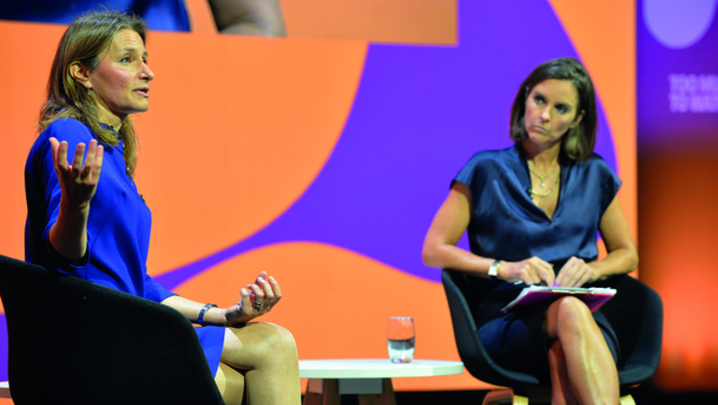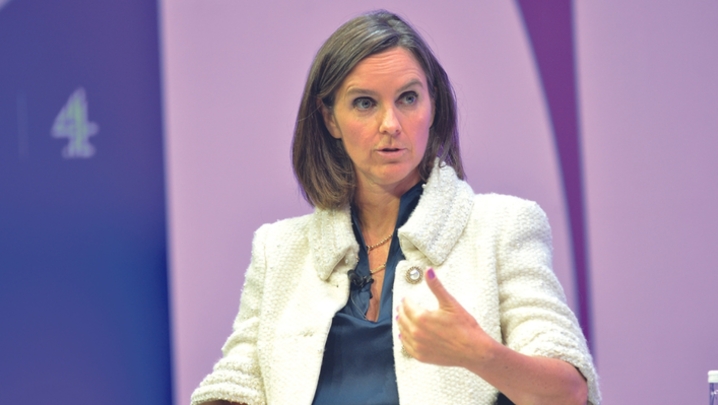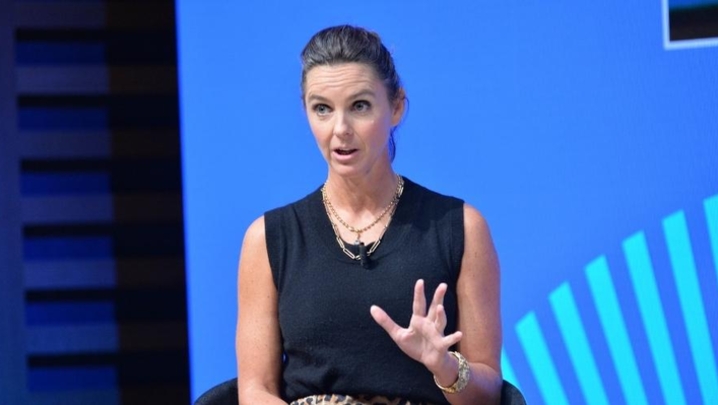For six frenetic years, CEO Alex Mahon has lived Channel 4’s brand, says Steve Clarke – and still found time to chair this month’s RTS Cambridge Convention
Ask Alex Mahon to name the best bits about her job and without hesitation she says it’s when outstanding programmes receive the recognition they deserve. It could be a breakthrough comedy such as Derry Girls or Russell T Davies’s bittersweet It’s a Sin – or the recent Cannes Grand Prix winner, Film4’s The Zone of Interest, Jonathan Glazer’s German-language Holocaust film based on the Martin Amis novel.
“For me, at the heart of everything is delivering great shows. When we have something that cuts through and feels very Channel 4 and people react to it, I am always delighted,” she says. “That’s the ultimate high of running a channel, isn’t it?”
And the lows? “Privatisation was quite gruelling [because] government thinking about privatisation was not done in a ‘normal process’ way.” That the then-culture minister Nadine Dorries announced the plan via Twitter during the Easter recess in April 2022 was “really hard”, says Mahon. “That’s not normally done. We didn’t know in advance. Those things are hard because you think, ‘We’ve got to get an organisation through this. We’ve got responsibility for staff.”
As we all know, privatisation was abandoned in January after Dorries’ successor, Michelle Donelan, re-examined the evidence. Instead of putting Channel 4 on the market and potentially damaging Britain’s world-class independent production sector, Donelan hailed the broadcaster that turned 40 last November as “a British success story and a linchpin of our booming creative industries”.
There would be some reforms, most significantly a plan to set up an in-house production arm and grow the number of roles outside London but, thanks chiefly to Mahon’s careful pragmatism, Channel 4 would remain in public ownership and retain its quintessentially British role as an enfant terrible that, on its day, can still make the UK’s other public service broadcasters look staid. Naked Attraction anyone?
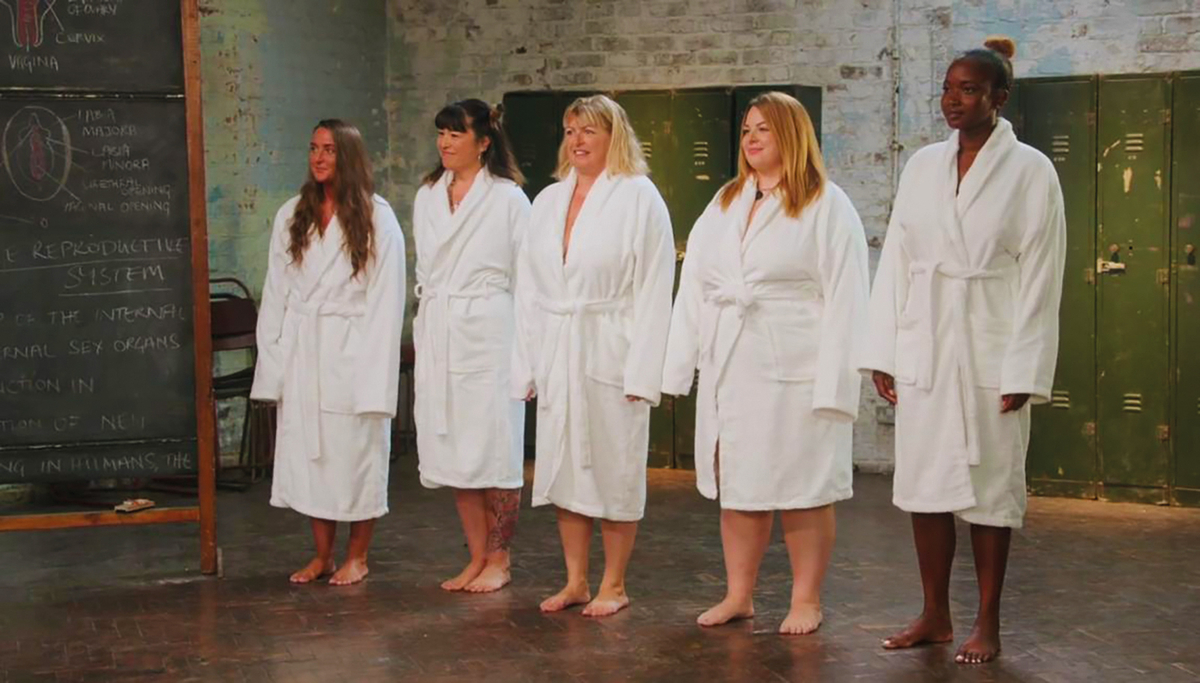
All this, plus the effort of setting up a new HQ in Leeds, with satellite offices in Bristol, Glasgow and Manchester, and steering the broadcaster through Covid has still seen Channel 4 hold its own commercially in a radically changing and fiercely competitive marketplace.
Mahon gives credit to her “incredible team” for enabling Channel 4 to come through these testing years in such good shape: “People care very deeply about the purpose of Channel 4. Compared with a normal company, they will do a huge amount.… The team is stunning. You don’t want to work at Channel 4 unless you care deeply about its public service purpose and you feel an affinity with the brand being risky, noisy, mischievous, a bit of trouble.”
This editorial approach, perhaps, played a part in the Johnson Government’s determination to privatise the broadcaster. Remember that, in her 2019 MacTaggart lecture, Channel 4’s then-Head of News and Current Affairs, Dorothy Byrne, accused the Prime Minister of being a liar. Three months later, during the general election campaign, Channel 4 News replaced Johnson with a block of ice when he declined to participate in a debate on global warming.
Does Mahon think the desire to privatise Channel 4 was politically motivated? “Some people have said that, but not me. The Government had every right to look at it. In the end, the right decision was reached.”
Does she feel like her back has been permanently pressed against the proverbial wall these past six years? “I’d say that it has never felt relaxing. But, equally, every day at Channel 4 is a total joy. It’s so interesting, whether it’s watching our news or a show we did last week, Gregg Wallace: The British Miracle Meat [a provocative satire in which people cope with the cost of living crisis by trading human body parts as meat], or dealing with how to attract young people with public service sex education content.
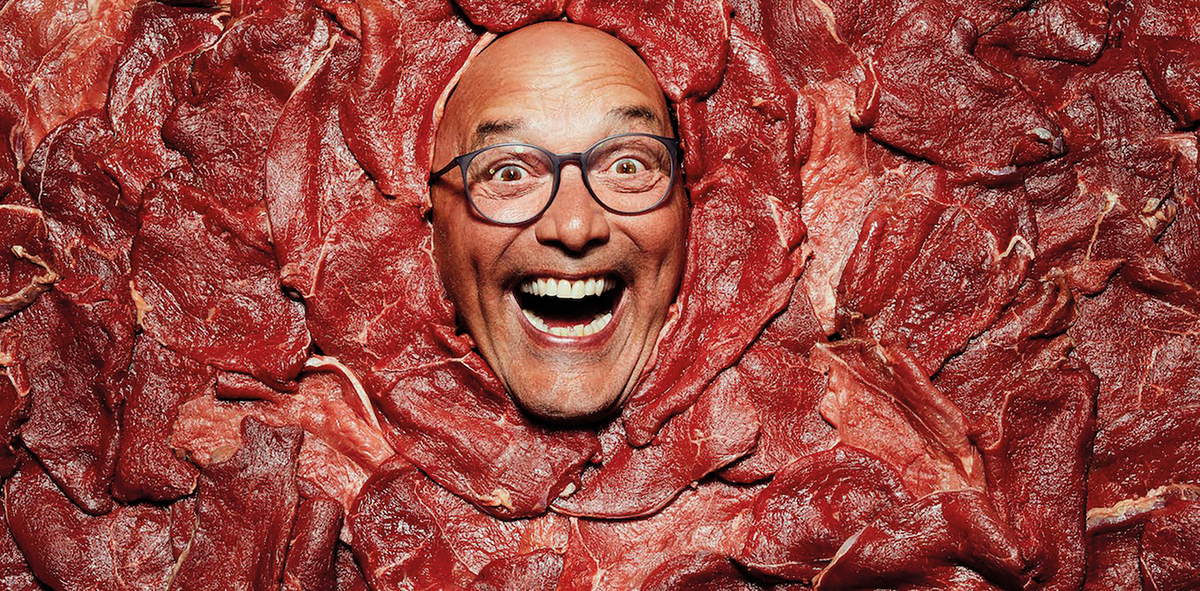
“We ended up doing Naked Education. Loads of people make a fuss about it but it’s exactly the right kind of show to be making if you want to address the issues facing 16-year-olds who’ve seen loads of porn but never seen a naked body.”
One could be forgiven for thinking that Mahon, who began work in the TV sector in 2000 at Luxembourg-based RTL Group (which once owned Channel 5), after working as a scientist, thrives on adversity.
How does she relax? “Drinking, watching television, gossiping,” she says with perhaps a dash of irreverence before adding: “I do plenty of exercise because, for me, it’s a de-stresser. I don’t like exercise, but I find it relieves stress. I’ve got four kids so I’m quite busy at weekends.” They are aged 16, 14, 13 and 11. “It’s much easier than it was when they were four under-fives.”
She continues: “I genuinely love watching television. I am quite excited today because the last episode of Hijack [the Apple TV+ thriller] is coming out. As soon as I finish work, I’m going to watch that.”
On this Zoom link, when the call starts, I barely recognise her: her hair is pulled back and much of her face is obscured by an outsized pair of designer glasses that wouldn’t look out of place on a 1940s Hollywood star.
A month earlier she co-hosted a press conference at Channel 4’s Horseferry Road office to launch the broadcaster’s annual report. It revealed some impressive stats concerning the switch to digital and diversifying revenues: 22% of the group’s advertising income is now generated online; and only two-thirds of its total revenues come from linear advertising.
“It’s hard to do, it’s hard to change how broadcasters operate,” Mahon notes. While some of her bigger rivals have struggled to nail the digital dollar, Channel 4 has proved itself adept at building a young, online audience.

To what does she attribute this success? “We started earlier – Channel 4 started streaming before anyone else. We were the first AVoD service in the UK and the first globally. We’ve always had a younger audience, so we faced these challenges earlier. I was convinced and adamant that Channel 4 had to go for digital growth as fast as possible. We’ve been on that journey for five years. We’re probably the only broadcaster that prioritises digital over linear.”
Building a public service streamer that resonates strongly with young people, albeit on a scale that is dwarfed by the US behemoths, is a considerable achievement. Digital youth brand Channel 4.0 launched last October and has since generated more than 47 million views, 73% coming from 13- to 24-year-olds. So much for this demographic being immune to the charms of TV.
Untold, Channel 4’s noisy, youth-focused current affairs strand launches its third series later this year.
The strategy is to focus on topics and areas and ways of making things that are interesting to young people and to tell stories from their perspective and avoid being judgemental. Mahon freely admits that content such as The Secret World of Incels and Life After Love Island aren’t her idea of a fun night in watching TV but needs no reminding that they resonate with their intended audience.
She adds: “Long term, none of us, as public service broadcasters, are big enough individually to fight a Netflix or an Amazon or an Apple. So, you have to make your content relevant, purposeful and your brand noisy, so that it stands out.” This has been Channel 4’s mantra for decades, arguably the one constant at the broadcaster as leaders have come and gone.
Mahon is the first woman to run Channel 4. How would she describe her management style? “Am I the best person to answer that? You’d have to ask someone who works for me.… What I try to do is to find excellent people and provide the conditions for them to be a success. And work out what my part is for each of them differently to help them to be able to deliver that.”
People have described her to me as “pragmatic” – is that fair? “Yes, I’m pragmatic… I don’t think that’s untrue.”
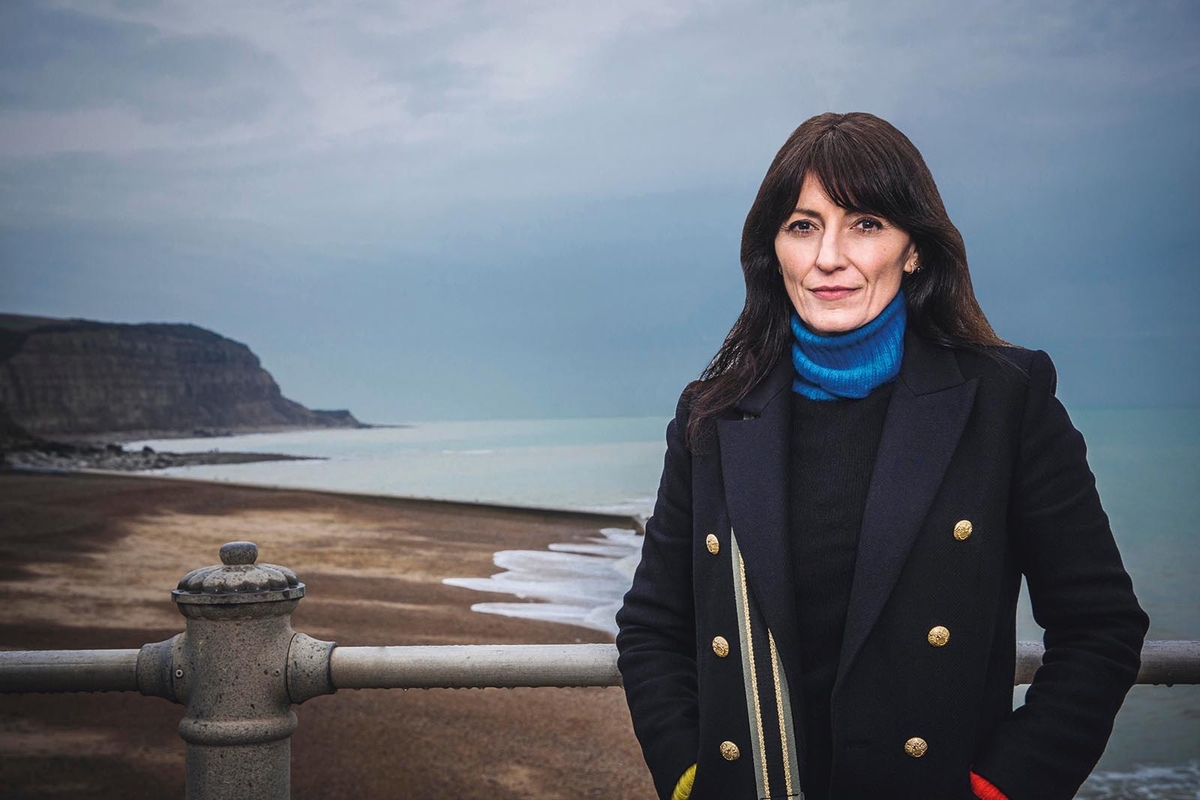
When she was at Shine, the super-indie she ran from 2006, what did she learn from working alongside the company’s founder, Elisabeth Murdoch? “Lis is amazing. What I learnt was to never be daunted by things looking difficult and to think big. Also, to search for… the people who are the best creatively and who are entrepreneurial. Lis embodied that mantra at Shine. She was always about, ‘What can we do next?’ and thinking big. She always wanted to seek out the best people and give them the tools to succeed.”
Did she bring these attitudes with her to running Channel 4? “In my own way, but [with the hint of a grin] not necessarily with the money of the Murdochs. Yeah, we try and empower creative people and believe in big ideas. The best thing about Channel 4, and this is why it’s different to other broadcasters, is that it is seeking to maximise editorial risk.
“We have an organisation that is structured – and some journalistic publications may be like this – to creatively innovate and to take editorial risks, investigative risks, comedic risks. Our organisation is structured in a way to optimise our ability to deliver that. Many editorial organisations are structured in a way to reduce risk. We’re the opposite of that. That’s what makes it a very creative place.”
As well as the day job, Mahon is chairing the RTS’s Cambridge Convention, where she’s aiming for some trademark Horseferry Road envelope pushing. “You have to work quite hard as chair to ensure you are being provocative and pioneering, and doing new sessions, because it can fall slightly into stasis.”
She’s been a Cambridge regular since 2001, when both John Malone and Rupert Murdoch cancelled following the 9/11 attack on the Twin Towers. “It was a real shock to me to find all the British TV industry gathered in this one room for two days. I’d never been to Cambridge, so [missed] the whole going to Harry Potterville for the big meals [in King’s], the establishment nature of it and the importance that people put on the discussions.”
"The best thing about Channel 4… is that it is seeking to maximise editorial risk"
Did she stay in a college room? “I can’t remember. Maybe I’ve blocked that out,” Mahon laughs. “I thought how exciting and vibrant this industry is – to come to a conference like Cambridge where decisions are made in the room, and it’s reported in the press.
“This year’s theme, ‘Too much to watch’, is an opportunity for the industry to ask itself, ‘What will we need to do to succeed in this crowded landscape?’, which I don’t see getting any less crowded.” She adds: “Much like film, we’re going to need to have more mastery of distribution and marketing. We already need to think through more carefully about titling and casting compared with traditional television.
“I think this raises quite significant questions about what PSB means to young people. What do the broadcasters’ brands mean for them, particularly if they’re under 18?
“From a public service British industry perspective, what do we want that to mean? How prevalent do we want public service content to be? What does that mean from a legislative, prominence and distribution perspective?”
A lot to chew on, then. So, what does she hope delegates will take away from the convention? “The best Cambridges are when you go away feeling you’ve learnt something, and you’ve heard a fresh opinion or fresh perspective.
“You want to leave thinking, ‘Oh, that’s made me think differently.’”
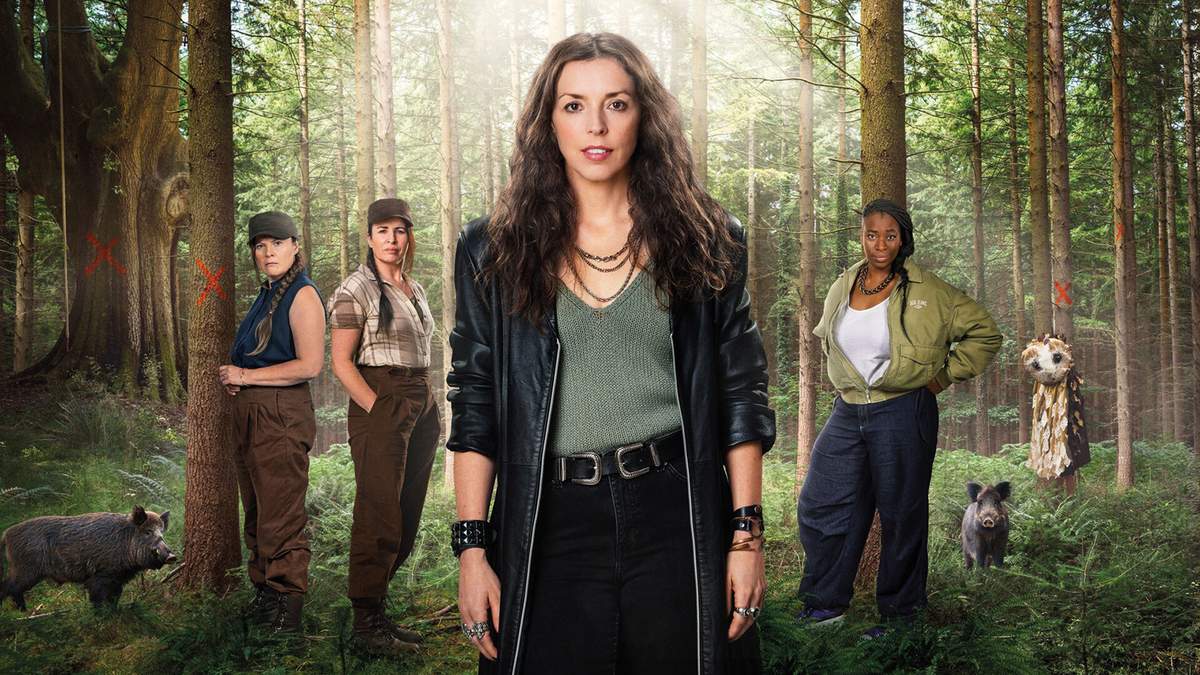
What Mahon still wants to achieve
‘You can always have more creative success. That’s a constant drumbeat but the next big thing for us is: what does the next five years look like digitally?
‘What do we have to change next in terms of how we’re distributed, who we partner with and what kind of content we have to continue to appeal to consumers.
‘We’re at a very tricky time in the landscape, where public service content needs to be made stronger in terms of its visibility to UK consumers.’
A day in the life of a CEO
‘The first thing I do is look at my phone to check the press clips. If anything is going to knock my day sideways, it’s what you weren’t expecting to find in the 3:00am press clips, which I read about 7:00am. I then faff about getting my kids to school. There’s a lot of shouting, getting them out of the door.
‘At work, it could be strategy or meeting an advertiser or talking to Ian [content chief Ian Katz] about shows or thinking about how we change the genre mix, given the impact of streaming.
‘Today, I’ve been in a streaming meeting for an hour, examining our unique reach for certain shows and considering which metrics and KPIs we need to think about. Also: what are the latest big SVoD shows? How is the tracking going for the launch of Alone next week? So it’s a real mix.
‘Normally, I have quite lot of things in the evenings – stakeholder events, screenings, maybe advertiser dinners.
‘It’s a bit non-stop but never, ever boring. There are no boring meetings.’
Boosting PSB to improve choice
‘If we want public service television to be important to consumers, which I’m assuming we do… everyone wants the high-quality public service content we’ve got in Britain. We all want a strong BBC.
‘Even the BBC’s detractors say they want a strong BBC. We want that ecosystem, but the regulators and government need to understand that, to have that, it needs to be super easy for consumers to find. Every device that kids have seen in their lives has a YouTube logo on it. But they haven’t had the equivalent for Channel 4, ITV or the BBC. Updating that is increasingly urgent.’

